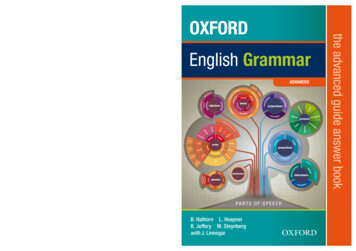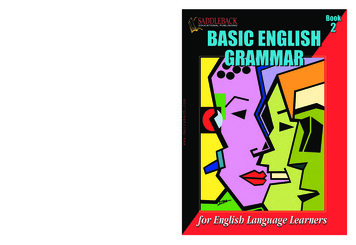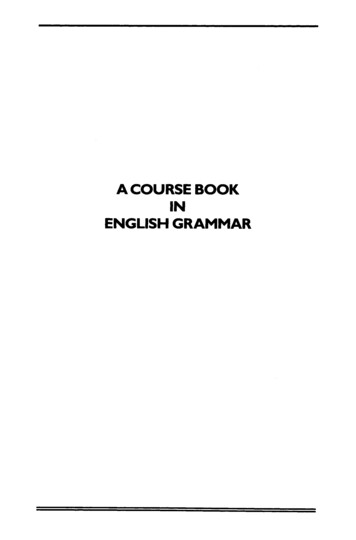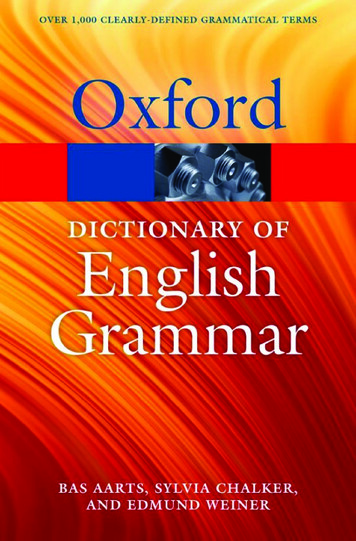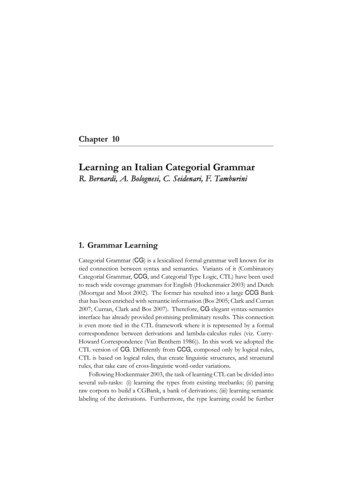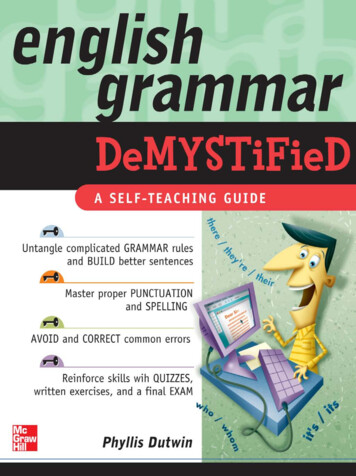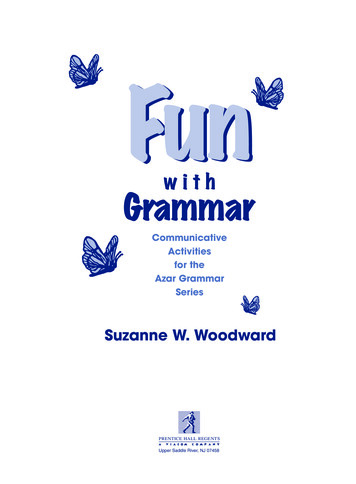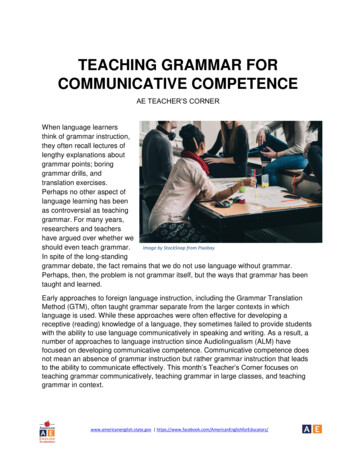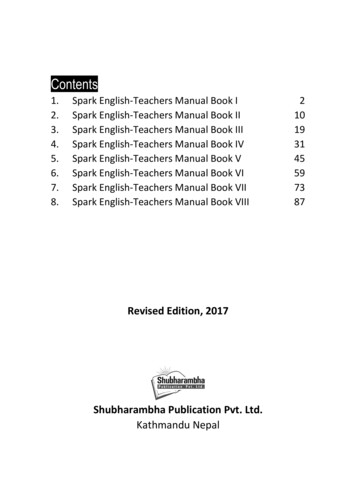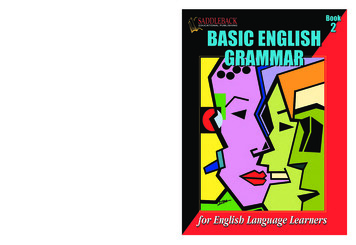
Transcription
BookBASIC ENGLISHGRAMMAR2Beginning to intermediate students of all ages will greatlybenefit from a clear understanding of English grammarbasics. This is the ideal supplement to your language artsprogram whether your students are native English speakers orbeginning English language learners. Skill-specific lessonsmake it easy to locate and prescribe instant reinforcementor intervention. Lessons are tightly focused on core concepts of grammar More than 80 practice exercises are included for readyreinforcement A wealth of examples are provided on every topic Concise explanations are bolstered by extra grammartips and useful language notesBASIC ENGLISH GRAMMAR Book 2BookBASIC ENGLISHGRAMMAR2
Book2Howard Sargeant
Three WatsonIrvine, CA 92618-2767Web site: www.sdlback.comFirst published in the United States by Saddleback Educational Publishing, 3 Watson, Irvine,CA 92618 by arrangement with Learners Publishing Pte Ltd, SingaporeCopyright 2007 by Saddleback Educational Publishing. All rights reserved. No part of this bookmay be reproduced in any form or by any means, electronic or mechanical, including photocopying,recording, or by any information storage and retrieval system, without the written permission of thepublisher.ISBN 1-59905-203-2Printed in the United States of America13 12 11 10 09 08 07
Note to the Studentfrom the PublisherGrammar is a very old field of study. Did you know thatthe sentence was first divided into subject and verb byPlato, the famed philosopher from ancient Greece? Thatwas about 2,400 years ago! Ever since then, students allover the world have found it worthwhile to study thestructure of words and sentences. Why? Because skill inspeaking and writing is the hallmark of all educatedpeople.Lesson by lesson, this book provides basic instructionin the eight parts of speech—nouns, pronouns, verbs,adjectives, adverbs, prepositions, conjunctions, andinterjections—as well as the standard patterns of Englishsentences.All students of English, be they native speakers or thosewho are studying English as a second language, willprofit from the fundamental introduction and review ofgrammar provided by SADDLEBACK'S BASIC ENGLISHGRAMMAR 1 and 2. Helpful marginal notes throughoutthe books have been provided to reinforce existing skillsand call attention to common problem areas.We wish you every success in your pursuit of Englishproficiency.
What you’ll find in this book12NounsCommon NounsProper NounsSingular NounsPlural NounsCollective NounsMasculine and Feminine NounsThe Possessive Form of NounsPronounsPersonal PronounsReflexive PronounsPossessive PronounsDemonstrative PronounsInterrogative PronounsIndefinite Pronouns 34AdjectivesKinds of AdjectivesThe Order of AdjectivesAdjective EndingsDescribing What Something Is Made ofThe Comparison of AdjectivesAdjective PhrasesDeterminersThe ArticlesUsing Nouns without ArticlesDemonstrative DeterminersQuantifying DeterminersInterrogative DeterminersPossessive DeterminersNumbersUsing Determiners 4332333537394244–514445464749495050
5678Verbs and TensesSubject and Verb AgreementTransitive and Intransitive VerbsThe Simple Present Tenseam, is and arethere is and there areThe Present Progressive TenseThe Simple Past Tensewas and wereIrregular VerbsThe Past Progressive Tensehave, has and hadThe Present Perfect TenseIrregular Past ParticiplesThe Future Tensedo, does and didThe InfinitiveThe Imperative Form of VerbsGerundsAuxiliary Verbscan and couldwill and wouldshall and shouldought tomustmay and mightVerb PhrasesAdverbs and Adverb PhrasesAdverbs of MannerAdverbs of TimeAdverbs of PlaceAdverbs of FrequencyAdverbs of DurationAdverbs of EmphasisPrepositions and Prepositional PhrasesPreposition or Adverb?Prepositions of PlacePrepositions of TimePrepositions of DirectionPrepositions with Special UsesPrepositions with Adjectives, Verbs or 1102102103103105
9101112Conjunctionsand, but and orConjunctions Linking PhrasesConjunctions with ListsConjunctions That Join SentencesOther Words for andOther Words for butOther Words for orConjunctions of TimeConjunctions of PlaceConjunctions of ReasonConjunctions of PurposeSentencesFour Kinds of SentenceSentences with ObjectsVerbs with Two ObjectsVerbs with No ObjectSimple SentencesCompound SentencesConditional SentencesPositive and Negative SentencesQuestionsQuestion TagsDirect and Indirect t SpeechIndirect SpeechIndirect CommandsIndirect Punctuation Marks: period, comma, question mark,exclamation point, apostrophe, quotation marks, colonCapital LetterA List of Irregular Verbs 9–152
1NounsThere are two main types of nouns: common nouns and proper nouns.Common NounsWords for people, places and things are called common nouns. These common nouns are words for things.rulerpencrayonspencilbookdictionarycourage rcomputerprinterThese common nouns are words for animals. Notice that special names foryoung animals are included.animalits younganimalits lecubcalfjoeycubcubcubcalfThese common nouns are words for rportgas ficemosquetempleshopgympost officepolice stationrestaurantsupermarketstadiumsynagoguechurch
Nouns: Proper Nouns These common nouns are words for people who do certain pilotdriverwriterfriendbrothergardenerpolice officerplumberfarmerclerktechnicianProper NounsThe names of particular people, places and things are proper nouns. Theyalways begin with a capital letter. These people’s names are proper nouns.Robin HoodAladdinFrankensteinHarry PotterSanta ClausMahatma GandhiConfucius Florence NightingaleMuhammad AliGeorge WashingtonDavid BeckhamJulia RobertsNelson MandelaAlex RodriguezMiss ParkMrs. TaylorMr. YoungDr. LeeProfessor RajJoseYang MingThe names of the days of the week and the months of the year are propernouns.days of the ndaymonthsSTAUGU 4 11ySundaaydnoMydTues asdayWedneaydsrThuFridayaySaturd MomDadGrannyGrandadUncle DavidAunt DianaMs. Hall18 2519 2625 120 276 1321 2847 122 298 15123 3061931217 243 berOctoberNovemberDecember
Nouns: Proper Nouns The names of special days and celebrations are also proper nouns.New Year’s DayVeterans' DayMother’s DayThanksgivingIndependence DayMemorial DayValentine’s DayHalloweenLabor DayChristmasRamadanYom KippurThe names of famous places, buildings and monuments are proper nouns.Big Benthe Empire State Buildingthe Sphinxthe Taj MahalGracelandthe Eiffel Towerthe Grand Canyonthe Golden Gate Bridgethe Sydney Opera Housethe Great Wall of ChinaBuckingham PalaceChaco Canyon Pueblothe Leaning Tower of Pisathe Statue of LibertyThe names of people who live in a particular country are also lyJapanKoreaMalaysiaAfghansAustraliansthe Britishthe Chinesethe FrenchGermansIndiansIndonesiansItaliansthe JapaneseKoreansMalaysiansSamoaNew ZealandPakistanthe PhilippinesRussiaNicaraguaSouth AfricaSpainSwitzerlandThailandUSAVietnamSamoansNew uth AfricansSpaniardsthe SwissThaisAmericansthe Vietnamese
Exercise 1Write each common noun under the correct ryplacespeopleExercise 2Underline the common nouns and circle the proper nouns in these sentences.1. I told Uncle John about my accident.2. Kim and Stephanie wore masks on Halloween.3. The lawnmower is broken.4. We’re going to the movies tomorrow.5. The lion is playing with one of its cubs.6. My sister’s favorite soccer player is David Beckham.7. I’m watching a videotape about the Sahara Desert.8. The tourists visited Rome and saw the Colosseum.9. Does this bus go to the stadium?10. We’re reading a story about a boy called Harry Potter.Exercise 3Read the following passage containing common nouns and proper nouns. Put a C inthe box after a common noun and a P in the box after a proper noun.Mr. Peterslives in Maineand a dog. He likes to travel to different countriesto Parisrestaurants10in a big houseand saw the Eiffel Tower.by the sea. He has three cats. Last Christmas. He enjoyed eating French food, he wentin nice
Nouns: Singular Nouns; Plural NounsSingular NounsNouns can be singular or plural.When you are talking about just one thing or person, use a singular noun.For example:a tenta taxia housea parka doctora ladyan ideaan ovenan exercisePlural NounsUse a plural noun when you are talking about two or more people, places orthings. Just add s to make most nouns plural.singularpluralsingularplurala computera chaira traina playera teachera taxicomputerschairstrainsplayersteacherstaxisa mountaina riveran envelopean insectan ovenan unclemountainsriversenvelopesinsectsovensunclesN o t e sn Words called articles or determiners are used to signal nouns.a rivera castlean armchairan ideathree biscuitsfive eggsn The article an is used before nouns that begin with the vowels a, e, i, o and u.an artistan ovenan eyean umbrellaan insectn The article a is used before nouns that begin with the other letters, called consonants.But some words don’t follow these rules. a uniform, a unit, a user: a, not an, is used because the vowel u in these words ispronounced like the word you; an hour, an heir, an honor: an, not a, is used because the consonant h in these wordsis not pronounced.11
Nouns: Plural Nouns 12Nouns that end in s, ss, ch, sh or x, are made plural by adding rushesflashesboxesfoxesMost nouns that end in y are made plural by changing the y to i andadding esliliespartiesdictionariesNouns that have a vowel before the y are made plural by simply adding s atthe rolleysvalleys
Nouns: Plural Nouns Many nouns that end in f are made plural by changing the f to v andadding sshelveswolvesthievesBut some nouns that end in fare made plural simply byadding s. roofshandkerchiefscliffspuffsSome nouns that end in f can bemade plural in two ways.singularpluralscarfhoofdwarfwharfscarfs or scarveshoofs or hoovesdwarfs or dwarveswharfs or wharvesMost nouns that end in fe are made plural by changing the f to v andadding esmidwives13
Nouns: Plural Nouns Most nouns that end in o are made plural by adding ooskangaroosBut other nouns that end in o aremade plural by adding es. roesSome nouns change spelling from the singular form to the footgoosemenwomenchildrenpeoplemiceteethfeetgeeseN o t e sWhat's the plural of the kindof mouse that you use with acomputer? The plural is eithermice or mouses.The plural form of some nouns is the same as the singular p (not sheeps)deer (not deers)fish (not fishes)aircraft (not aircrafts)salmon (not salmons)N o t e sWhen you are talking about differentkinds of fish, the plural can be fishes,for example:the various fishes of the Indian Ocean
Nouns: Plural Nouns Some nouns are always sspectaclesgogglesscissorsbinocularspliersSome nouns are usually ogssocksN o t e sYou can use a pair of with theseplural nouns. For example:a pair of trousersa pair of pantsa pair of glassesa pair of scissorsa pair of chopsticksa pair of sandalsa pair of glovesExercise 4Underline all the nouns in the following sentences. Are they common or proper nouns?Put a checkmark in the correct box.common nouns proper nouns1. Do you like cheese?2. They stood next to the Niagara Falls.3. May I borrow your umbrella?4. The ambulance was driving very fast.5. Carl did not agree with them.6. She loves to visit Disneyland.7. Would you like some more water?8. The fog was very thick.9. May I invite Tom to join us?10. My car is very old.15
Exercise 5Read the following passage. Write S in the box after each singular noun and P in thebox after each plural noun.Our teacherclassis a very nice ladyand she tells us very funny storiesthe animalson a farmfaster than the ducksmice. She’s very kind to all the children. Yesterday, she told a story. They all had a raceand cows. The pigs, but the heroes. They were faster than all the other animalsshortest legsin theaboutand sheepof the storyranwere the, even though they had the!Exercise 6Read the following passage. Notice that the plural nouns are missing. Write the correctplural form of the singular nouns in parentheses. The first one has been done for you.Threeladies(lady) in pinkfor a walk in the zoo. They saw fourtwo(dress) took their(giraffe), three(baby)(hippo),(kangaroo) and an elephant. They walked for so long that their(foot) became sore, so they sat down on a bench for a rest near some(monkey). The(box) and throwing(lady) looked at theirhome.16(monkey) were playing with cardboard(stick) at each other. After a while, the(watch) and decided it was time to go
Nouns: Collective NounsCollective NounsWords for groups of people, animals or things are called collective nouns. Here are some collective nouns for groups of people.a familya teama communitya choira bandan orchestraan audience a crewa cluba committeea companya gangthe governmentthe armyCollective nouns may be used with a singular verb or with a plural verb. Ifthe group is acting as a single unit, use a singular verb. If group members areacting as individuals, use a pluralverb. For example:N o t e sAlways use a plural verb with thecollective nouns, people and thepolice. For example:The crowd was orderly.orThe crowd were clapping, yellingand cheering. Here are more collective nouns you can use for groups of people.a crowd of shoppersa company of actorsa class of schoolchildren Those people live (not lives) in Asia.The police have caught (not hascaught) the thief.a gang of thievesa panel of judgesa platoon of soldiersMany groups of animals have their own special collective nouns.a herd of cattlea flock of birdsa drove of sheepa gaggle of geesea pack of wolvesa pride of lionsa pod of dolphinsa school of fisha litter of puppiesa troop of monkeysa brood of chickensa swarm of bees17
Nouns: Collective Nouns Some groups of things also have their own special collective nouns.a bunch of bananasa cluster of grapesa bunch of flowersa bouquet of flowersa range of mountainsa fleet of shipsa fleet of vehicles Some nouns name the amount or form of something.a loaf of breada ball of string a deck of cardsa flight of stepsa suite of roomsa suite of furniturea set of toolsa string of beadsa grove of treesa bar of soapa bar of chocolateThe words a piece of mean a single serving or part of something.a slice/piece of breada piece/square of chocolatea sheet/piece of papera piece of informationa slice/piece of cheesea slice/piece of cakea piece of chalka piece of adviceExercise 7Read the following passage. Write the missing collective nouns in the blank spaces.Remember that sometimes there are two words you can use.Mom took Kate, Rudy and Derrick to the zoo. The zoo was very busy. Aof people had gathered round the monkeys. One of the monkeys had aof bananas. Watching the monkey eat made the children feel hungry. Mom took aof bread and someof cheese out of the picnic hamperand everyone made sandwiches. After eating the sandwiches, the children had twoof chocolate each. Rudy wanted to give one piece to a monkey, but thezookeeper gave Rudy a very usefulbut sometimes they are very fierce,” he said.18of advice. “Monkeys may look friendly,
Exercise 8Read the sentences. Does the collective noun indicate a group acting together as asingle unit? If so, circle the singular verb. Does the collective noun indicate a group inwhich each member acts individually? Circle the plural noun.1. The jury (were/was) arguing about the importance of evidence.2. A whole company of soldiers (is/are) marching in the parade.3. A gaggle of geese (is/are) running every which way in the barnyard.4. Those people (live/lives) in North America.5. The police (has/have) arrested the suspect.6. That troupe of actors always (stay/stays) at the Grand Hotel.7. The committee (is/are) handing in their ballots.8. Our school band (play/plays) many lively marches.9. A big colony of ants (lives/live) under the front porch.10. The government (are/is) entitled to collect taxes.Exercise 9Complete each phrase with a noun from the box that names a part or an amount y1. aof stars5. aof potatoes2. aof sand6. aof bookends3. aof paper7. aof ice cream4. aof salt8. aof rain19
Nouns: Masculine and Feminine NounsMasculine and Feminine Nouns Masculine nouns are words for men, boys and male animals.Feminine nouns are words for women, girls and female ssempresswitchactresspolicewomanwaitressMany nouns are used for both males and females. They are called commongender nouns.teacherpupilchild esidentmanagerWith animals, there is one general word for the animal and special wordsfor the male and the female. Sometimes the word for the male animal is thesame as the general word. Sometimes the word for the female animal is thesame as the general sterdrakebullganderfoxtigerlion
Exercise 10Complete the crossword puzzle with the correct masculine or feminine nouns.DOWNAcrossmasculinemasculinefeminine1.2. waiter4. husband7. nephew8.11.3. bull5. man6. fox9.princess10.empressfeminineactressauntgoose12. stallion13. brother14. king15.duck16.witch1234567891011121314151621
Nouns: The Possessive Form of NounsThe Possessive Form of NounsUse the possessive form of a noun to show ownership. To make the possessive form, put an apostrophe and an s ’ssingular noun.after aThis is my bed and that is Peter’s bed.We all like Dad’s cooking.It is my job to collect everybody’s plate after the meal.The flies are buzzing around the horse’s tail.This is Susan and Jenny’s room.This is Tom’s hat and that is Tom’s father’s hat.N o t e s How do you make the possessive form when two names linkedby and are the owners? Put an ’s after the second name only. Forexample:Katy and Mike’s house is very big. ( the house that belongs to bothKaty and Mike)Joe and Sarah’s dad works at the shoe factory. ( He is Joe’s dad andhe is also Sarah’s dad.) Sometimes two possessive forms with ’s appear together, one afterthe other:This is John’s brother’s ball. ( The ball belongs to John’s brother.)Paul’s teacher’s house has a swimming pool. ( the house thatbelongs to Paul’s teacher) After plural nouns that don’t end in s, use an apostrophe and an s ’s tomake the possessive form.The children’s room is always messy.Some people’s houses are bigger than ours.Rats’ tails are longer than mice’s tails.Men’s voices are deeper than women’s voices.22
Nouns: The Possessive Form of Nouns After plural nouns that end in s, just add an apostrophe s’ .The pupils’ desks are arranged in rows.The boys’ bedroom is bigger than the girls’ bedroom.The strong winds destroyed all the farmers’ crops.Mice’s tails are shorter than rats’ tails.N o t e sWhen a name ends in s, you can make the possessive form ineither of two ways: add an apostrophe and an s ’s , or addjust an apostrophe ’ . For example:This is James’s house.Which is Charles’s bike?ororThis is James’ house.Which is Charles’ bike?Exercise 11Read the following passage. The possessive nouns are missing. Write the correctpossessive form of the nouns in parentheses. The first one has been done for you.Peter is spending the day atTom’s(Tom) house. Peter likes Tom’s family. He(Tom’s mom) cooking! The boys play lots of gamesespecially likestogether.(Tom) sister doesn’t likeShe is playing by herself. Sometimes thethat Mom tells them to go and play in the garden.(Tom and Peter) games.(boys) games become so noisy(Tom) dog is in thegarden, lying in the sunshine. Tom wants to play with the dog, but Peter is afraid of the(dog) big teeth and sharp claws.At 7 o’clock,likes(Peter) dad arrives in his car to take Peter home. Tom says he(Peter’s dad) new car.(Peter) dad says thathe’ll take Tom for a ride in it sometime.23
2 PronounsA pronoun is a word that takes the place of a noun. There are different kindsof pronouns.Personal PronounsPersonal pronouns may be used as:n the subject of a verb, orn the object of a verb. Subject PronounsThe subject of a verb does the action of the verb. The personal pronounsI, you, he, she, it, we and they can all be used as the subject of a verb. Studythe following two sentences:Lisa likes cats. She has four cats.In the first sentence, the proper noun Lisa is the subject of the verb likes.In the second sentence, the pronoun she is the subject of the verb has.Here are some more pairs of sentences that show personal pronouns usedas subjects of verbs.My name is Michael. I am fourteen.My father works hard. He works in a factory.My sister is older than me. She is twelve.Our dog is very naughty. It likes to chase cats.Bob, you are a bad dog!David and I are playing football. We like sports.Jim and Jeff are my brothers. They are older than I am.24
Pronouns: Personal Pronouns Object PronounsThe object of a verb receives the action of the verb. The personal pronounsme, you, him, her, it, us and them can all be used as the object of a verb.Look at the following two sentences:Lisa likes cats. She likes to stroke them.In the first sentence, the noun cats is the object of the verb likes. In thesecond sentence, the pronoun them is the object of the verb stroke.Here are some more pairs of sentences that show personal pronounsused as objects of verbs.I’m doing my homework. Dad is helping me.Goodbye, children! I’ll call you later.Where is John? I need to speak to him.Miss Garcia is very nice. All the children like her.The car is very dirty. Mom is cleaning it.Uncle Harry called Mary to ask her a question.My chocolates are all gone. Someone has eaten them.First Person, Second Person and Third PersonIn grammar, the person who is speaking is called the first person. The onespoken to is called the second person, and the one spoken about is called thethird person.Here is a table to help you remember which pronouns to use.subjectobjectfirst person singularsecond person singularthird person singularIyouhesheitmeyouhimheritfirst person pluralsecond person pluralthird person pluralweyoutheyusyouthem25
Pronouns: Reflexive PronounsReflexive PronounsReflexive pronouns are words that refer to the noun or pronoun that isthe subject of the verb. The words myself, yourself, himself, herself, itself,ourselves, yourselves and themselves are reflexive pronouns.My brother built this computer himself.Be careful not to cut yourself with that knife.John was looking at himself in the mirror.Kate fell and hurt herself.Our cat washes itself after every meal.We baked the cake by ourselves.Come in, everybody, and find yourselves a seat.The children cleaned their room all by themselves.Bears like to rub themselves against a tree.The bird washed itself by splashing in a puddle.The players train every day to keep themselves fit.Have yourselves a good time.Here is a table to help you remember which reflexive pronoun to use withwhich personal pronoun.26singular personalpronounreflexivepronounplural personalpronounreflexivepronounI (subject pronoun)myselfwe (subject pronoun)ourselvesme (object pronoun)myselfus(object pronoun)ourselvesyou (subject/objectyourselfpronoun)you (subject/objectpronoun)yourselveshe (subject pronoun)himselfthey (subject pronoun)themselveshim (object pronoun)himselfthem (object pronoun)themselvesshe (subject pronoun)herselfher (object pronoun)herselfititself
Pronouns: Possessive Pronouns; Demonstrative PronounsPossessive PronounsPossessive pronouns are used to talk about things that belong to people.The words mine, yours, his, hers, ours and theirs are possessive pronouns.This book is mine.Have you lost yours, Tom?This pen is mine and that one is his.Sarah has lost her cat. Is this cat hers?I can see our car, but where is yours?We’ve had our lunch, but they haven’t had theirs.Here is a table to help you remember which possessive pronoun to use withwhich personal pronoun.singular personalpronounpossessivepronounplural personalpronounpossessivepronounI, meyouhe, himshe, hermineyourshisherswe, usyouthey, themoursyourstheirsDemonstrative PronounsDemonstrative pronouns are used for pointing out things. The words this,that, these and those are demonstrative pronouns.This is my desk.These are my pets.This is the Mings' house.These are sheep but those are goats.That is my friend’s house.Those are horses.That’s my mother’s car.You’ll have to work harder than this.We can do better than that.It’s raining again. This is awful!Who is that knocking at the door?Hi, Kathleen. This is Michael.N o t e sn Use this and these when you aretalking about things near you.n Use that and those when you aretalking about things farther away.27
Pronouns: Interrogative Pronouns; Indefinite PronounsInterrogative PronounsInterrogative pronouns are usedto ask questions. The words who,whose, what, which and whom areinterrogative pronouns.N o t e sn In writing and formal speaking, youcan also use whom as the object ofverbs and prepositions. For example:Whom did the president criticize?Whom is the principal talking to?orWho used all my paper?To whom is the principal talking?Who is Mom talking to?but you cannot use whom as the subjectof a verb. So you cannot say:Who are those people? Whom came to the party last night?Whose pen is this?You have to say: Who came to the party last night?Whose are these shoes?n Who can be used as the subject or theobject of a verb. For example:What is your brother’s name?Who broke the window? (as the subject)Who are you inviting to your party?(as the object)What does Tom want?What is the date today?n Who can be used as the object of apreposition. For example:What do you want to be whenyou grow up?Who is Mom talking to?Which of these desks is yours?Which do you prefer?n You can also use whom as the object ofa preposition. For example:Which of your sisters is the tallest?Whom did the President criticize?Whom is Mom talking to?If you put the preposition before theinterrogative pronoun, you must usewhom:To whom is Mom talking?Inedefinite Pronouns An indefinite pronoun does not refer directly to any other word. Mostindefinite pronouns express he idea of quantity.Everybody is welcome at the meeting.Many prefer their coffee with sugar.Does anybody care for a cheese sandwich?Few choose to live in the arid desert.28
Pronouns: Indefinite Pronouns Indefinite Pronounsallanotheranyanybodyanyoneboth ynoneno oneoneotherseveralsomesomebodysomeonesuchThe pronoun they is considered an indefinite pronoun when it makes anindefinite reference.They produce a lot of coal in your state.Why don't they repair the bad roads?Exercise 1Read the following passage. Write the missing subject and object pronouns in theblank spaces.My name is Charlie.have two brothers.are both older than. Sometimes they take me to the park andtogether. I like playing football withbecause they are very good. We aregoing to the park today. Would you like to come withall play together. Afterwards,to. I thinkpizzas. Doplay football?can come to my house ifwill like my dad. He is very funny andcanwantmakes greatlike pizza?29
Exercise 2Some of the reflexive pronouns in the following sentences are used correctly, but someare not. Put a checkmark in the box if the reflexive pronoun is correct. Put an x in the box if it is not correct. Then write the correct reflexive pronoun in the blank space.1. Sometimes I wash the dishes all by himself.2. Dad had an accident. He cut herself3. Sally washes the car by herselfwith a knife.4. Do you think the doctor can cure itself5. The cat stays clean by licking itselfwhen he is ill?.6. Anna and May made the dinner all by herself.7. Mom lets me walk to school by myself8. Can you dress themselves9. David can swim all by himself10. This light is automatic. It switches itself., boys and girls?now.on at night.Exercise 3Write a short sentence using each of the interrogative pronouns below.Example: WhoWhoWhoseWhatWhichWhom30Who is this man?
Exercise 4Read the following passa
Lesson by lesson, this book provides basic instruction in the eight parts of speech—nouns, pronouns, verbs, adjectives, adverbs, prepositions, conjunctions, and interjections—as well as the standard patterns of English sentences. All students of English, be they native speakers or those who are stu
